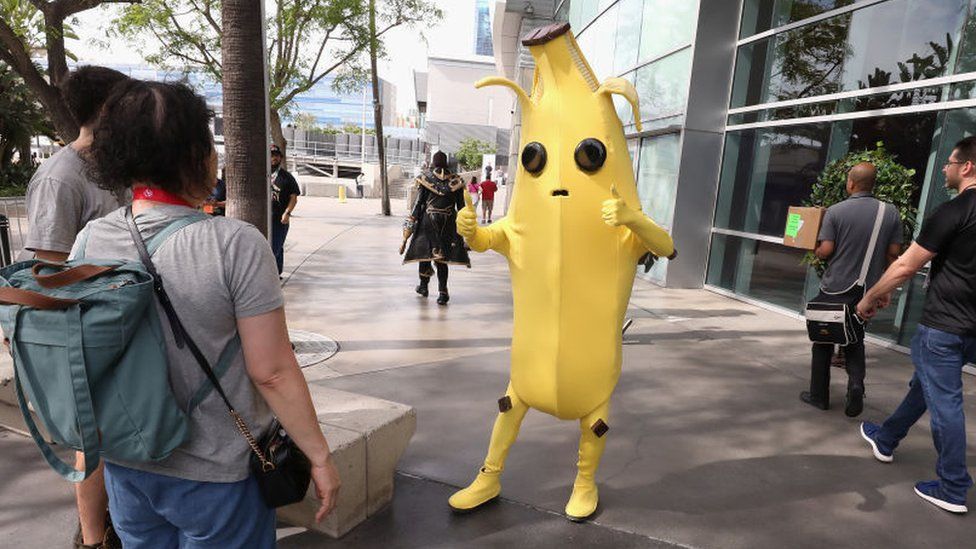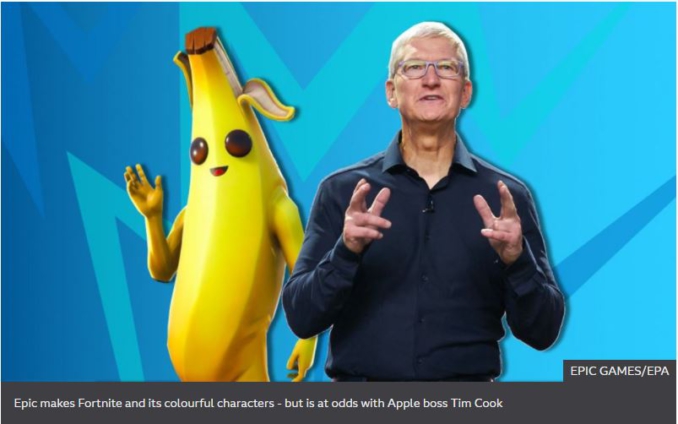Apple boss Tim Cook took the witness stand for the first time in his company's major legal battle with Epic Games over an alleged monopoly.
Epic, maker of the hit video game Fortnite, claims Apple's tight control over iPhone apps hurts competition.
During his appearance, Mr Cook argued that keeping control of the App Store helped keep iPhones secure.
He also said he did not know if the App Store made a profit, telling the court Apple did not break down the figures.
Facing questions about the level of profit the App Store generates from the 30% commission it takes on sales, he said: "We don't have a separate profit and loss statement for the App Store."
Instead, he said that he had a "feeling" that it was profitable - but could not share figures with the court.
Mr Cook was being questioned about his oversight of top-level decisions around the App Store's policies.
Judge Yvonne Gonzalez Rogers also questioned Mr Cook, asking about a survey that showed 39% of developers are dissatisfied with the app store.
Wow, the Epic-Apple judge is currently pressing Tim Cook harder than Epic's lawyers did. And they didn't go easy. She's pushing him on whether they truly face competition, pushing him that a survey showed 39% of devs dissatisfied with app distribution. "How is that acceptable?"
— Stephen Totilo (@stephentotilo) May 21, 2021
The BBC is not responsible for the content of external sites.
Mr Cook said he was not familiar with the survey but said there was a "friction" because Apple rejected 40% of apps weekly.
The judge also asked him if he was a gamer, to which he admitted that he was not.
Mr Cook's opposite number in the case - Epic Games chief Tim Sweeney - has already appeared on the stand in the opening days of the long-running legal battle.
What is the case about?
Two main things are at the centre of the case: the 30% commission Apple takes on in-app purchases, and the fact that no other app stores are allowed to exist on the iPhone and iPad to offer an alternative.
Epic's Fortnite is one of the most popular games in the world and makes its money through in-game purchases of character costumes and other digital items.
A 30% cut on millions of such purchases adds up to a lot - but Apple's rules forbid the company from circumventing its payment methods if a sale is made in the iPhone app.
In August last year, Fortnite offered players a 20% discount if they paid Epic Games directly, in direct violation of Apple's rules.
Apple quickly removed the app from its store - as did Google, which enforces a similar policy.
Epic had clearly expected that to happen. The firm immediately launched a PR blitz to mobilise its fanbase and win support, painting Apple as a dominating force suppressing freedom of choice.
Within hours, Epic lodged prepared legal complaints in the US against both Apple and Google.
But the debate goes beyond the 30% cut, to wider questions about competitiveness. Epic has made no secret of the fact that it would like to run its own app stores on both iOS and Android, avoiding Apple's and Google's payment and delivery systems entirely.

This was Tim Cook's first time giving evidence at trial.
There's no video footage of the court case but journalists can listen in to a terrible audio line that sounds like the trial is taking place under water. It's therefore hard to get a feel for the atmosphere of court.
Still, it's pretty clear that Mr Cook is having a tough day.
I'm used to hearing him asked questions in Congress. Usually he has a relaxed air - it takes a lot to get him flustered.
However a cross examination in court is a very different beast.
Grilled by an expert legal team, Mr Cook appeared more evasive.
He was asked, for example, how much profit Apple makes from its App Store. He replied that he didn't know. Considering the App Store is a massive money spinner for Apple, that is a surprise.
Google also pays a huge amount to Apple to have its search preloaded onto iPhones. Asked about this deal (believed to be worth around $10bn, or £7bn) Mr Cook didn't seem to know much about it, unable - or unwilling - to confirm how much this contract was worth.
Mr Cook may be reluctant to unveil commercially sensitive data. However, he came across as vague on detail. And that's not a good look when you're giving evidence in court.
Most experts believe this is Apple's to lose but anti-trust cases are notoriously difficult to predict.
And we're unlikely to get a judgement soon - there is a lot of evidence the judge has to wade through.
What has happened so far?
The legal cases against Apple and Google are separate, and Apple has been the first in court.
Apple is accused of running a monopoly, subjecting all apps to a cumbersome review process, and rejecting them for all sorts of reasons. Epic contends that is unfair, while Apple says it protects customers from dodgy apps.
Much of the early debate has been over definitions, with Epic arguing that Fortnite is more than a game, but rather a "metaverse" within which all sorts of experiences - including concerts and film screenings - are held.
But outside of the wrangling over technical definitions, there have also been some significant revelations.
The fact that Epic's model for its app store is not yet profitable is one of Apple's arguments against allowing an open system.
Documents have revealed that Epic has made heavy losses with game giveaways, which cost it millions of dollars. However, in return it has gained millions of new users for its PC gaming platform - the Epic Games store - which Epic says was always its strategy.
It has also emerged that Apple has debated lowering the 30% cut it takes in response to competition, with App Store chief Phil Schiller writing to Steve Jobs as long ago as 2011.
And one particularly memorable exchange was born out of a debate over adult content.
'It's just a banana ma'am'
Apple had highlighted that Epic's store hosted a store-within-a-store - Itch.io - which sells adult content. Apple gave this as an example of why it did not want third-party stores on its platforms.

Later, while showing images of Fortnite, Apple's legal team referred to Peely, a Fortnite character who is a banana.
It showed him in a tuxedo, remarking: "We thought it better to go with the suit than the naked banana, since we are in federal court this morning."
On cross-examination, Epic's attorney wanted to put to bed the "implication" that a naked banana might be inappropriate, resulting in Epic's marketing boss informing the court: "It's just a banana, ma'am."
Latest Stories
-
Immigration judge says Columbia University student Mahmoud Khalil can be deported
3 hours -
Kenya: Opposition tells Prez Ruto- You are no Kibaki
4 hours -
Uganda and Zimbabwe open Rugby Africa Women’s Cup Division One with wins
4 hours -
Why Salah turned down ‘£500m Saudi move’ for Liverpool stay
4 hours -
I died, went to heaven but God sent me back – Actress Doris Ogala
5 hours -
‘I am not intimidated’ – Rev. Ntim Fordjour breaks silence after botched arrest attempt
5 hours -
NPP will be better if the ‘demons’ are evicted from the party – Prof Frimpong-Boateng
5 hours -
Maison Yusif Fragrance makes history with ‘The Apex’ – Africa’s best selling niche fragrance
7 hours -
Braye hits hat-trick as Medeama beats Dreams FC 4-0
8 hours -
Electricity tariffs up by 14.75%, water by 4.02% in latest review
8 hours -
Francophonie Festival 2025: A celebration of education and culture
8 hours -
Most Ghanaians are like single-phased wires -Prof. Akosa
9 hours -
GUBA leads historic Memphis-Ghana Trade Mission, paving the way for diaspora investment
9 hours -
KNUST declares 2 former students persona non grata over indiscipline, campus disturbances
9 hours -
IGP clarifies comments on recruitment of Bawku youth into the police service
9 hours

